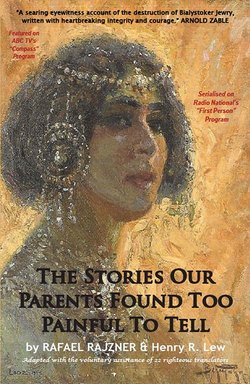Читать книгу The Stories Our Parents Found Too Painful To Tell - Henry R Lew - Страница 12
На сайте Литреса книга снята с продажи.
ORIGINAL FOREWORD.
ОглавлениеAN EYEWITNESS FROM HELL.
I have never felt so unworthy when writing an introduction to a new book. I feel like a scribe who is about to pick up a pen and start a new Torah. I am about to set foot on holy ground. I feel an urge to undergo penance, to purify my soul, to immerse myself in water. Perhaps I should have fasted.
Rafael Rajzner was a printer. He helped manage the cooperative printworks, which produced the daily newspaper “Undzer Leben.” He was never a journalist or a writer. To his credit he has not now tried to become one. His book is simply an eyewitness account, a chronicle of the final destruction of the Bialystoker ghetto.
Rajzner is in no way a pretentious man. He is merely a miraculous survivor, who felt a moral need to tell the world what Bialystok and its people went through. Future historians should be grateful to him for this testimony. For even though it is essentially an account of the destruction of a single town, it is also an important strand in the total fabric of the bestial destruction of European Jewry by Hitler’s Germany. It leaves us with no doubt as to what the Nazis and their collaborators could accomplish.
As I read Rajzner’s book I shuddered with painful nausea. I was overcome by every form of human emotion. I felt endless pity - burning love - searing anger - a poisonous thirst for revenge. And then suddenly I stopped believing. I told myself that such a story can only be a perverse fantasy of a sick mind - that no people can be so gruesome - so heartless - so wildly inhuman. And then I returned to reality.
I realised that this story was indeed true, but worse still it was not the whole truth, only a small part of it. And I realised that when victims start talking about revenge, about wiping all Germans off the face of the earth, they too are starting to sink into the dark void of a similar horror.
Rajzner’s simple writing style enhances his text and adds to its literary merit. This is because the events he writes about defy the concept of art in literature. No words can adequately describe them, no expressions can hope to encompass them. These are happenings which don’t lend themselves to poetic embellishment, they can only be described in naked simplicity. There is no wordsmith alive, whose pen can adequately capture the horrors that people endure - when they peer through small cracks in prison walls - watching thousands of naked human beings - their most beloved family members and friends among them - being herded through falling snow into gas chambers. Such pain is as endless as the sky over sand dunes, as vast as the ocean which drowns a solitary swimmer. Rajzner immortalises suffering simply. That is his great strength. Literature can always be forgotten. Rajzner’s chronicle should never be allowed to!
Yehoshua Rapaport (Melbourne 1947).
